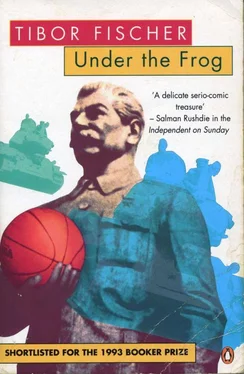Tibor Fischer - Under the Frog
Здесь есть возможность читать онлайн «Tibor Fischer - Under the Frog» весь текст электронной книги совершенно бесплатно (целиком полную версию без сокращений). В некоторых случаях можно слушать аудио, скачать через торрент в формате fb2 и присутствует краткое содержание. Жанр: Современная проза, на английском языке. Описание произведения, (предисловие) а так же отзывы посетителей доступны на портале библиотеки ЛибКат.
- Название:Under the Frog
- Автор:
- Жанр:
- Год:неизвестен
- ISBN:нет данных
- Рейтинг книги:3 / 5. Голосов: 1
-
Избранное:Добавить в избранное
- Отзывы:
-
Ваша оценка:
- 60
- 1
- 2
- 3
- 4
- 5
Under the Frog: краткое содержание, описание и аннотация
Предлагаем к чтению аннотацию, описание, краткое содержание или предисловие (зависит от того, что написал сам автор книги «Under the Frog»). Если вы не нашли необходимую информацию о книге — напишите в комментариях, мы постараемся отыскать её.
Shortlisted for Booker Prize 1993
Set in post-war Hungary between 1944 and 1956, this ferociously funny and bitterly sad story follows the fortunes of two young men in the pursuit of sex and the avoidance of work and army service. They survive the chaos of communism by becoming part of a travelling basketball team.
Under the Frog — читать онлайн бесплатно полную книгу (весь текст) целиком
Ниже представлен текст книги, разбитый по страницам. Система сохранения места последней прочитанной страницы, позволяет с удобством читать онлайн бесплатно книгу «Under the Frog», без необходимости каждый раз заново искать на чём Вы остановились. Поставьте закладку, и сможете в любой момент перейти на страницу, на которой закончили чтение.
Интервал:
Закладка:
Pataki insisted that they should hunt down Bánhegyi. ‘I feel like leaving before the doctors catch me.’ Providence was evidently in the mood to grant Pataki his wish because they found Bánhegyi just returning from a dislocation-certifying session with the doctor. ‘Yes,’ he said, ‘there are trains going out but I can’t be sure where the trains are going to. They chop and change the forms a lot.’ Bánhegyi wanted to wait a few days to study the opportunities, but Pataki wouldn’t hear of it. ‘Thinking about it isn’t going to make it any easier,’ he said. So at midnight they went down to the sidings and breaking the seal on a freight-wagon, prized it open. It was full of shoes. ‘Shoes are risky,’ said Bánhegyi, ‘they can go East or West.’
‘Is there anything else available tonight?’ asked Pataki.
‘No.’
‘Fine. This will do.’ He climbed aboard with a bag containing two loaves, cheese, six apples, a bottle of mineral water and three bottles of Czech beer whose last place of residence had been the Fischer flat. ‘Getting drunk is one of the few amusements possible in a dark freight-wagon full of shoes,’ said Pataki defending his choice of company.
They agreed on means of communication. ‘Even if it’s Siberia, do drop us a postcard,’ urged Gyuri.
‘Sure,’ said Pataki. ‘And let my parents know in a day or two. Tell them I would have told them but it’s easier for everyone this way.’ He handed Gyuri an envelope. ‘That’s a blanket apology for them. And tell them not to look for granddad’s wedding ring. I’ve got that. Does anyone know how many years you can get for this?’ He looked at Gyuri. ‘You’re really not coming, are you?’
‘Things can’t go on like this much longer.’
They closed the door and Bánhegyi resealed the wagon with the official implement.
23rd October 1956
On his way to the Ministry of Sport (as everyone referred to the National Committee for Physical Education and Sport which liked to pretend it wasn’t a ministry, since a ministry would detract from the atmosphere of amateurism they tried to cultivate) Gyuri spotted a ticket-inspector getting on the tram. Gyuri didn’t have a ticket. He never had a ticket. He had never had a ticket. Gyuri hadn’t paid a filler for public transport since the last years of the war. Furthermore, in all that time he had never even so much as contemplated paying. Not for a moment. This was, firstly, because he didn’t feel like handing over any of his money to the state, however trivial the sum, and secondly, because the trams were normally so crowded, only a risible percentage of his body got in. Most of the time, he had to hang on by one hand, with one foot perched on the running-board, in the company of several similarly positioned citizens and he didn’t feel that such a posture justified payment.
Seated for once, Gyuri was wondering at what point he should vacate the tram, when at the other end, a blue-overalled worker suddenly barked at the ticket-inspector: ‘When the state starts paying me valid money, that’s when I’ll have a valid ticket, okay?’ The ferocity of the outburst was astonishing, much more than one would have believed the question of a tram ticket could have elicited even in the most extreme of circumstances. It hushed the whole tram and centred everyone’s attention in anticipation of some good transport theatre. Ordinarily, people who weren’t interested in paying or weren’t able to jumped off the tram at the approach of the authorities, as Gyuri did, like a tree losing its leaves.
The ticket-inspector had obviously tripped on a long-festering rage. His inquiry had opened the door to a crowd of resentments, and the rebuff’s raw savagery, with its billboarded promise of corporeal damage, both imminent and merciless, persuaded him to move on. Gyuri had only witnessed total refusal once before. An elderly man, flanked on both sides by enormous, slavering Alsatians that he was having difficulty restraining, had smiled at the request to produce his ticket and stated: ‘I honestly don’t feel like paying.’ He hadn’t.
His dignity imperilled, the ticket-inspector had got off at the Astoria. Looking out, Gyuri could see slim groups of students milling around with placards. They had been quiet for a while, cowed by some of the best brutality available on the planet, but now the Hungarians were back at it again, the national pastime: complaining. Everyone seemed to be at it. Even the Writers’ Union, the home of moral malnutrition, was at it, suddenly disclaiming all the things they had written in the last few years. The Union had pulled its head out of Rákosi’s arse and now stood blinking in the daylight.
Setting out for the disciplinary hearing, Gyuri had heard from Laci, Pataki’s younger brother, that the students from the Technical University were going to hold a demonstration. ‘You know, a real demonstration; one that was our idea.’ There was dispute as to whether permission had been granted for it or not. Some rulers said yes, some said no. The students didn’t care apparently.
The demonstration wouldn’t make any difference to anything. Gyuri hadn’t said so to Laci, since Laci had been so delighted by the prospect, but he had been tempted to quote the words of Dr Hepp: ‘Gentlemen, you can turn bearshit upside down. You can take it for a trip to the Balaton. You can put it in a nice box with a blue ribbon. You can shout at it or compose an ode in its honour. It will remain bearshit.’
So what if they changed the Party leader as they had in Poland? So what if the new leader vilified the old leader? What if they had a Gero instead of a Rákosi? Or a Nagy instead of a Gero? They were all turds off the same production line. It was like making a fuss about changing a light bulb. What if the new leader blamed everything on the old leader? It was political leapfrog, musical chairs in the Central Committee. Why get excited by it?
Gyuri’s view of the morning was soured by his attendance being required at a disciplinary hearing, but he was cheered up by the AVO incident.
At the Astoria, an AVO officer got on (uniformed AVO were harder to spot on the streets now – they seemed ill at ease). He was carrying a smart briefcase smartly. He exuded a vigorous belief in his importance, it was as if his importance was flamboyantly doing chin-ups in the tram. A group of labourers was next to him. Dirty, hardy, work-darkened figures who would no doubt place head-kicking at the head of their leisure pursuits. You could see it coming. They took their time, though, eyeing up the officer as the tram rattled along. At the next stop, one of them leaned over and asked him stentoriously to the accompaniment of pálinka fumes: ‘Tell me, did you brush your teeth this morning?’
‘What?’ asked the AVO, puzzled by this forewordless inquiry.
‘Did you brush your teeth this morning?’ insisted his interrogator.’Yes,’ was the only thing the AVO could think of as a reply.
‘Excellent. In that case, just this once, you can lick my arse.’
The detonation of laughter practically blew the AVO officer off the tram. Gyuri felt privileged to be in at the making of an anecdote that would enliven many an evening in a kocsma. Carrying his massive discomfiture awkwardly, the AVO noticed his stop had arrived and alighted.
At the Ministry of Sport, Hepp was waiting outside, looking at his watch angrily as if it were colluding with Gyuri’s tardiness. They weren’t late for the hearing but Hepp always liked to be ten minutes ahead of events. Gyuri really went out of his way to be there on the dot for Hepp, because if you weren’t, you’d pay for it. ‘But we said eleven o’ clock,’ Hepp would say, sincerely bewildered as to why such a clear agreement hadn’t been respected. And he would keep on saying it until you feared for your sanity. If you pleaded tram-famine, earthquake, your home suddenly combusting, Hepp would merely say: ‘Why didn’t you start earlier?’.
Читать дальшеИнтервал:
Закладка:
Похожие книги на «Under the Frog»
Представляем Вашему вниманию похожие книги на «Under the Frog» списком для выбора. Мы отобрали схожую по названию и смыслу литературу в надежде предоставить читателям больше вариантов отыскать новые, интересные, ещё непрочитанные произведения.
Обсуждение, отзывы о книге «Under the Frog» и просто собственные мнения читателей. Оставьте ваши комментарии, напишите, что Вы думаете о произведении, его смысле или главных героях. Укажите что конкретно понравилось, а что нет, и почему Вы так считаете.












